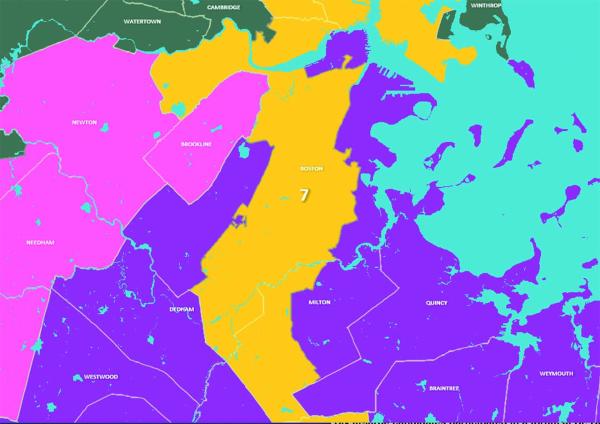November 3, 2021

State lawmakers are proposing some tweaks to US Rep. Ayanna Pressley’s district, also known as the 7th Congressional, which splits Boston and Dorchester with US Rep. Stephen Lynch.
The 7th Congressional District represented by US Rep. Ayanna Pressley — the state’s only majority-minority district — would become even more diverse under a redrawing of the state’s nine US House districts that also seeks to nearly evenly divide the state’s population.
With the state’s entire House delegation planning to seek reelection to Congress in 2022, the districts they currently represent will grow nearly equally - by about 53,588 people - the next time their names appear on ballots.
Pressley splits Boston, including Dorchester, with US Rep. Stephen Lynch, a South Boston Democrat.
State Rep. Michael Moran, the House lead on redistricting, said on Monday that the proposed districts have a deviation of just one person, adding that the map would strengthen the majority-minority status of the Boston-based district represented since 2019 by Pressley.
If the maps are approved by state lawmakers, several Dorchester precincts could see changes in representation. Savin Hill’s Ward 13, Precinct 9 would be represented by Lynch instead of Pressley. In Fields Corner, Pressley would pick up some of Ward 16. Close to the Boston-Milton border, two precincts (16-8 and 16-11) would also flip to Lynch from Pressley.
House and Senate leaders on Monday released the draft of a map that would draw new political boundaries for all nine US House districts, providing some clarity for members of Congress and potential challengers eyeing the 2022 elections. The districts must be equal in size.
The equality of size follows the guidelines upheld by the Supreme Court in a number of cases for Congressional redistricting, but differs from that of the legislative districts finalized last week that kept deviations in the size of districts for House and Senate lawmakers under 5 percent.
Moran also said the minority population in the 7th Congressional District represented by Pressley would grow from 56.6 percent to 61.27 percent, under the proposed map.
Pressley’s district was created in 2011 and represented through 2018 by former US Rep. Michael Capuano, a veteran Somerville Democrat who lost to Pressley in a Democratic primary.
Unlike 10 years ago, Moran and his legislative colleagues in charge of redistricting have only had to contend with a growing and shifting state population, rather than the loss of a seat in Congress that directly and indirectly led to two veteran politicians retiring in 2010.
That shift is expected to produce an expansion in territory covered by the state’s westernmost 1st Congressional District, where the population did not grow as fast.
With the population of Massachusetts growing 7.4 percent to more than 7 million people over the last decade, the ideal size of the state’s nine Congressional districts has grown to 781,102 people. The near equal distribution of people across the districts to within one person was a goal of Moran’s. The Boston Democrat avoided lawsuits when he led the redistricting process in 2011, and is attempting to do the same this round.
The redistricting committee plans to receive feedback on its maps for the next eight days and convene a public hearing next Tuesday (Nov. 9). After that, co-chair Sen. William Brownsberger (D-Belmont) said, members hope to finalize their decisions “very shortly” with the Nov. 17 end of formal lawmaking sessions for 2021 looming.
“We hope to complete the final legislation by early to mid-next week and then to vote on it early to mid-the following week,” he said.



